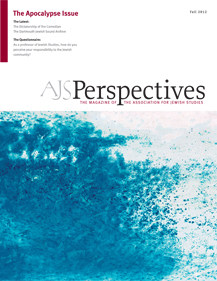Dear Colleagues,
As the executive director of a non-profit organization in the midst of a prolonged national economic crisis, I never take for granted the ability to present positive reports to the board of directors. Indeed, over the past nine years that I have served as executive director of the AJS, I have with few exceptions been able to share good news: about a growing membership, record-breaking conference submissions, new grantfunded programs, exciting new initiatives. Thanks to the devotion and foresight of an extraordinary series of presidents, board members, volunteers, and staff, the AJS membership has grown close to 40 percent since the early 2000s, it has received several hundred thousands of dollars in outside funding, and its range of programs and services has increased several-fold.
While the AJS does what it does very well, I think it is still vital for the organization's health to ask, is there more that we could be doing? Should we look beyond our traditional programs to other areas of activity? Are there other projects and services we might undertake that would enhance the professional lives of our members and the field of Jewish Studies as a whole? Many organizations only face these questions during a period of crisis—for example, when there is a constituency that no longer sees the organization as relevant or a cause that no longer needs redress. But what better time for the AJS to reflect on its work, its mission, and its activities than from a position of stability and strength?
The AJS Board of Directors has decided to address these questions by launching a six-month strategic planning process, beginning this fall. This process will be led by Marta Siberio, a highly experienced and respected organizational consultant, and the AJS Strategic Planning Committee: Beth Berkowitz (Barnard College), Mark Kligman (HUC-JIR), Rebecca Kobrin (Columbia University), Hartley Lachter (Muhlenberg College), Joshua Lambert (University of Massachusetts, Amherst and National Yiddish Book Center), Vanessa Ochs (University of Virginia), Rona Sheramy (AJS), Adam Teller (Brown University), Shelly Tenenbaum (Clark University), and Jeffrey Shandler (chair, AJS President, Rutgers University).
This will be the AJS's first strategic plan, and it comes at a time both of great strength for the organization and of rapid shifts in the landscape of the academic profession, especially in the humanities and the social sciences, due to economic concerns, technological developments, and other factors. These developments are transforming how scholars do research, teach undergraduates, and train graduate students. Through this strategic planning process, AJS will reflect on its mission and will map out key areas on which the organization should focus its attention and resources over the next several years. Our utmost priority is to preserve the core mission of the AJS—to promote, maintain, and improve teaching and research in Jewish Studies at colleges, universities, and other institutions of higher learning. Through this strategic planning process, we will strive to ensure that we are doing so in the most relevant, thoughtful, and meaningful ways possible in a changing scholarly environment.
This strategic planning process will consist of several components, including several opportunities for members to share their vision for the organization. The Strategic Planning Committee will meet several times with the consultant to discuss key organizational issues, review findings at each stage, and plan next steps. Marta Siberio will also conduct interviews with board members, editors, AJS staff, and several supporters, in order to understand the culture of the organization, the community it serves, its status and reputation within and outside the membership, and the interests of its various constituencies. She will also reach out to executive directors of other learned societies to gain greater insight into their policies, programs, funding, and organizational structure, and to learn how other societies' best practices might be applied to the AJS.
Perhaps most importantly, Marta Siberio will attend the AJS Conference in December, where she will hold a focus group with AJS members, as well as have an opportunity to experience the one event that brings our diverse field together. The AJS will be inviting international members, and U.S. members from institutions outside the Northeast, to participate in this focus group and share their vision for the organization, profession, and field as a whole. The AJS will also be providing other opportunities for members to offer feedback and share their ideas, including an online survey in the early spring.
The final result of this process will be a plan document that will outline the AJS's strategic vision for the next three years, the goals and objectives needed to accomplish that vision, and specific programs and resources required to fulfill these goals. This will be a flexible plan; our intent is not to limit the projects and plans the AJS can take on but rather to provide a road map for the next few years, which will ensure that the AJS's activities best reflects its members' and the field's needs and goals. We hope to share the plan's findings with the AJS membership by summer 2013. Until then, please don't hesitate to contact me with any ideas or thoughts you have. I look forward to your input and to sharing in an exciting new vision for the AJS's future.
Rona Sheramy
Association for Jewish Studies

